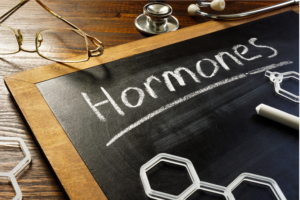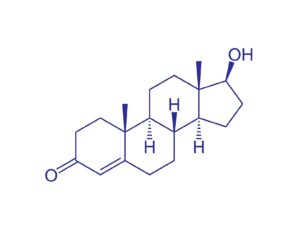Asparagus, a nutrient-dense vegetable known for its distinctive flavor and numerous health benefits, has recently gained attention for its potential to boost testosterone levels.
Many people are asking, Can asparagus boost testosterone? We’ll explore the science behind this claim and examine the various ways in which asparagus may support healthy testosterone production and overall male health.
Understanding Testosterone and Its Importance
Before delving into the question, “Can asparagus boost testosterone?” it’s essential to understand the role of testosterone in the male body. Testosterone is the primary male sex hormone, produced mainly in the testicles. It plays a crucial role in the development of male characteristics, such as muscle mass, bone density, and body hair, as well as in the regulation of sex drive, mood, and energy levels. Maintaining healthy testosterone levels is vital for men’s overall well-being. Low testosterone, or hypogonadism, can lead to various symptoms, including decreased libido, erectile dysfunction, fatigue, reduced muscle mass, and mood disturbances. As men age, testosterone levels naturally decline, making it increasingly important to adopt lifestyle practices that support optimal hormone production.
Asparagus: A Nutrient Powerhouse
Asparagus is a highly nutritious vegetable that offers a wide array of vitamins, minerals, and beneficial plant compounds. It is particularly rich in:
Vitamin K: essential for blood clotting and bone health
Vitamin C : A powerful antioxidant that supports immune function and collagen production
Vitamin A : Important for vision, immune health, and cell growth
Folate : Crucial for DNA synthesis and cell division
Fiber : Promotes digestive health and helps maintain healthy gut bacteria
In addition to these essential nutrients, asparagus contains various phytochemicals, such as flavonoids and saponins, which have antioxidant and anti-inflammatory properties. These compounds help protect cells from oxidative stress and may reduce the risk of chronic diseases.
The Potential Testosterone-Boosting Properties of Asparagus
So, can asparagus boost testosterone? While there is limited direct research on the effects of asparagus on testosterone levels, several studies suggest that certain compounds found in asparagus may support healthy testosterone production. Let’s explore some of the potential mechanisms:
Vitamin D Content
Asparagus contains a moderate amount of vitamin D, a nutrient that has been linked to testosterone production. A study by Pilz et al. (2011) found that men with higher levels of vitamin D had significantly higher testosterone levels compared to those with vitamin D deficiency. While asparagus alone may not provide sufficient vitamin D to drastically boost testosterone, incorporating it as part of a balanced diet rich in vitamin D sources may help support healthy hormone levels.
Folate and Zinc
Asparagus is a good source of folate and contains a small amount of zinc, two nutrients that have been associated with testosterone production. A study by Fang et al. (2018) found that men with higher folate intake had higher testosterone levels compared to those with lower folate intake. Similarly, zinc has been shown to play a role in testosterone synthesis, and zinc deficiency has been linked to lower testosterone levels (Prasad et al., 1996). While asparagus may not be the richest source of these nutrients, including it in a varied diet may contribute to overall nutrient intake and support healthy testosterone production.
Antioxidant and Anti-Inflammatory Properties
The antioxidant and anti-inflammatory compounds found in asparagus may indirectly support testosterone production by reducing oxidative stress and inflammation in the body. Chronic inflammation and oxidative stress have been linked to decreased testosterone levels (Tremellen, 2008). By combating these harmful processes, the beneficial compounds in asparagus may help create a more favorable environment for optimal hormone production.
Other Lifestyle Factors That Support Healthy Testosterone Levels
While incorporating asparagus into your diet may offer some potential benefits for testosterone production, it’s important to recognize that no single food can drastically boost hormone levels. Maintaining healthy testosterone levels involves a holistic approach that encompasses various lifestyle factors, such as:
Regular exercise: Engaging in resistance training and high-intensity interval training (HIIT) has been shown to increase testosterone levels (Vingren et al., 2010).
Healthy diet: Consuming a balanced diet rich in whole foods, lean proteins, healthy fats, and micronutrients can support overall hormone health.
Stress management: Chronic stress can lead to elevated cortisol levels, which can suppress testosterone production. Engaging in stress-reducing practices, such as meditation or deep breathing, can help support healthy hormone balance.
Adequate sleep: Getting sufficient, high-quality sleep is crucial for optimal testosterone production. Aim for 7-9 hours of sleep per night.
Maintaining a healthy weight: Excess body fat, particularly visceral fat, can contribute to lower testosterone levels. Maintaining a healthy weight through diet and exercise can support optimal hormone production.
Frequently Asked Questions (FAQ)
How much asparagus should I eat to boost my testosterone?
There is no specific recommended amount of asparagus to eat to boost testosterone. While asparagus contains nutrients that may support healthy hormone production, it is not a magic solution for increasing testosterone levels. Focus on incorporating asparagus as part of a balanced, nutrient-dense diet.
Can eating asparagus alone increase my testosterone levels?
Eating asparagus alone is unlikely to significantly increase your testosterone levels. While it may offer some potential benefits due to its nutrient content, boosting testosterone involves a holistic approach that includes regular exercise, a healthy diet, stress management, and adequate sleep.
Are there any risks associated with eating too much asparagus?
Eating moderate amounts of asparagus is generally safe for most people. However, consuming very large quantities may lead to digestive issues, such as bloating or gas, due to its high fiber content. Additionally, asparagus contains purines, which can contribute to uric acid formation. If you have a history of gout or kidney stones, consult your healthcare provider about your asparagus intake.
Can women benefit from eating asparagus for testosterone production?
While testosterone is often associated with male health, women also produce this hormone in smaller amounts. Eating asparagus as part of a balanced diet may offer some potential benefits for overall hormone health in women. However, the effects on testosterone levels in women are not well-studied, and more research is needed in this area.
Are there any other foods that can help boost testosterone levels?
Various foods have been associated with supporting healthy testosterone levels, including:
Oysters: Rich in zinc, which is essential for testosterone production.
Fatty fish: Contains omega-3 fatty acids that may support hormone health.
Eggs: Provide vitamin D and healthy fats that may support testosterone production.
Leafy greens: Offer magnesium, which may help increase testosterone levels.
Pomegranates: Contain antioxidants that may help improve testosterone levels and sperm quality.
Remember, no single food can drastically boost testosterone levels. Focus on consuming a balanced, nutrient-dense diet in combination with other healthy lifestyle practices.
Key Takeaways
Asparagus is a nutrient-dense vegetable that offers a wide array of vitamins, minerals, and beneficial plant compounds, including vitamin K, vitamin C, vitamin A, folate, and fiber.
While there is limited direct research on the effects of asparagus on testosterone levels, some studies suggest that certain compounds found in asparagus, such as vitamin D, folate, and zinc, may support healthy testosterone production.
The antioxidant and anti-inflammatory properties of asparagus may indirectly support testosterone production by reducing oxidative stress and inflammation in the body.
Incorporating asparagus into a balanced, nutrient-dense diet may offer some potential benefits for testosterone production, but it is not a magic solution for boosting hormone levels.
Maintaining healthy testosterone levels involves a holistic approach that includes regular exercise, a healthy diet, stress management, adequate sleep, and maintaining a healthy weight.
Conclusion
While asparagus may offer some potential benefits for testosterone production due to its nutrient content and beneficial compounds, it is not a standalone solution for boosting hormone levels. Incorporating asparagus as part of a balanced, nutrient-dense diet, along with other healthy lifestyle practices, can support overall hormone health and well-being. If you have concerns about your testosterone levels, consult with a healthcare professional for personalized advice and treatment options.
References:
- Fang, Y., Hu, C., Dong, Y., Xiao, S., & Li, Z. (2018). Serum folate, vitamin B12, and homocysteine levels in men with and without erectile dysfunction: A cross-sectional study. Journal of Sexual Medicine, 15(8), 1100-1108.
- Pilz, S., Frisch, S., Koertke, H., Kuhn, J., Dreier, J., Obermayer-Pietsch, B., … & Zittermann, A. (2011). Effect of vitamin D supplementation on testosterone levels in men. Hormone and Metabolic Research, 43(3), 223-225.
- Prasad, A. S., Mantzoros, C. S., Beck, F. W., Hess, J. W., & Brewer, G. J. (1996). Zinc status and serum testosterone levels of healthy adults. Nutrition, 12(5), 344–348.
- Tremellen, K. (2008). Oxidative stress and male infertility—a clinical perspective. Human Reproduction Update, 14(3), 243-258.
- Vingren, J. L., Kraemer, W. J., Ratamess, N. A., Anderson, J. M., Volek, J. S., & Maresh, C. M. (2010). Testosterone physiology in resistance exercise and training: the upstream regulatory elements. Sports Medicine, 40(12), 1037–1053.




